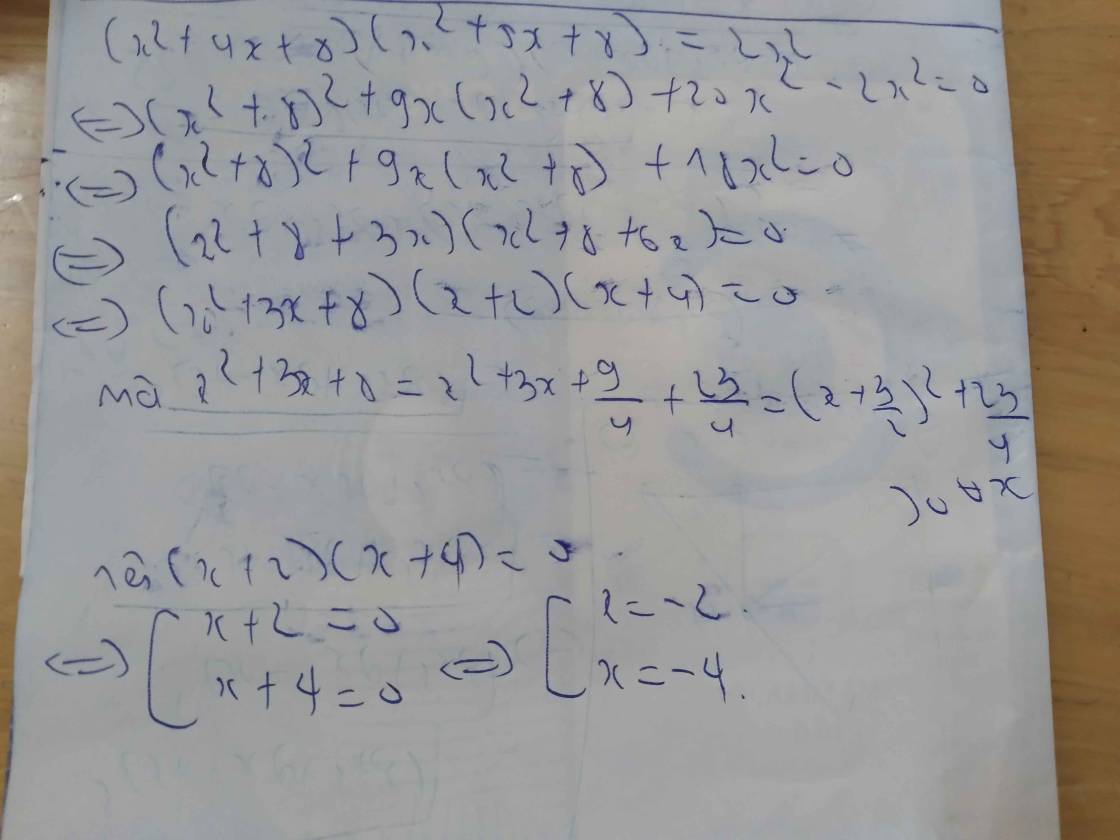
Hãy nhập câu hỏi của bạn vào đây, nếu là tài khoản VIP, bạn sẽ được ưu tiên trả lời.


\(=\left(x^2+5x+8\right)\left(x^2+4x+2x+8\right)=\left(x^2+5x+8\right)\left[x\left(x+4\right)+2\left(x+4\right)\right]\)
\(=\left(x^2+5x+8\right)\left(x+2\right)\left(x+4\right)\)
\(\left(x^2+4x+8\right)^2+3x\left(x^2+4x+8\right)+2x^2=\left(x^2+4x+8\right)^2+2x\left(x^2+4x+8\right)+x\left(x^2+4x+8\right)+2x^2\)
\(=\left(x^2+4x+8\right)\left(x^2+4x+8+2x\right)+x\left(x^2+4x+8+2x\right)\)
\(=\left(x^2+4x+8\right)\left(x^2+6x+8\right)+x\left(x^2+6x+8\right)\)
\(=\left(x^2+4x+8+x\right)\left(x^2+6x+8\right)=\left(x^2+5x+8\right)\left(x^2+6x+8\right)\)

\(\left(x^2+4x+8\right)^2+3x\left(x^2+4x+8\right)+2x^2=\left(x^2+4x+8+\dfrac{3}{2}x\right)^2-\dfrac{1}{4}x^2=\left(x^2+\dfrac{11}{2}x+8\right)^2-\left(\dfrac{1}{2}x\right)^2=\left(x^2+\dfrac{11}{2}x+8-\dfrac{1}{2}x\right)\left(x^2+\dfrac{11}{2}x+8+\dfrac{1}{2}x\right)=\left(x^2+5x+8\right)\left(x^2+6x+8\right)=\left(x+2\right)\left(x+4\right)\left(x^2+5x+8\right)\)
\(\left(x^2+4x+8\right)^2+3x\left(x^2+4x+8\right)+2x^2\)
\(=\left(x^2+4x+8\right)^2+x\left(x^2+4x+8\right)+2x\left(x^2+4x+8\right)+2x^2\)
\(=\left(x^2+4x+8\right)\left(x^2+5x+8\right)+2x\left(x^2+5x+8\right)\)
\(=\left(x^2+5x+8\right)\left(x+2\right)\left(x+4\right)\)

1) Ta có: \(x^2-4x+4=0\)
\(\Leftrightarrow\left(x-2\right)^2=0\)
\(\Leftrightarrow x-2=0\)
hay x=2
Vậy: S={2}

\(\left(x^2+4x+8\right)\left(x^2+5x+8\right)=2x^2\left(1\right)\)
\(\Leftrightarrow x^4+5x^3+8x^2+4x^3+20x^2+32x+8x^2+40x+64-2x^2=0\)
\(\Leftrightarrow x^4+5x^3+4x^3+8x^2+20x^2+8x^2-2x^2+40x+32x+64=0\)
\(\Leftrightarrow x^4+9x^3+34x^2+72x+64=0\)
\(\Leftrightarrow x^4+2x^3+7x^3+14x^2+20x^2+40x+32x+64=0\)
\(\Leftrightarrow x^3\left(x+2\right)+7x^2\left(x+2\right)+20x\left(x+2\right)+32\left(x+2\right)=0\)
\(\Leftrightarrow\left(x+2\right)\left(x^3+7x^2+20x+32\right)=0\)
\(\Leftrightarrow\left(x+2\right)\left(x^3+4x^2+3x^2+12x+8x+32\right)=0\)
\(\Leftrightarrow\left(x+2\right)\left[x^2\left(x+4\right)+3x\left(x+4\right)+8\left(x+4\right)\right]=0\)
\(\Leftrightarrow\left(x+2\right)\left(x+4\right)\left(x^2+3x+8\right)=0\)
\(\Leftrightarrow\left[{}\begin{matrix}x+2=0\\x+4=0\\x^2+3x+8=0\end{matrix}\right.\)
\(\Leftrightarrow\left[{}\begin{matrix}x=-2\\x=-4\\vô.nghiệm\left(\Delta=9-32=-23< 0\right)\end{matrix}\right.\)
\(\Leftrightarrow\left[{}\begin{matrix}x=-2\\x=-4\end{matrix}\right.\) là nghiệm của phương trình \(\left(1\right)\)

a) x3+4x-5 = x3-x2+x2+4x-5=(x3-x2)+(x2-x)+(5x-5)=x2(x-1)+x(x-1)+5(x-1)=(x2+x+5)(x-1)
b) x3-3x2+4=x3-2x2-x2+4=(x3-2x2)-(x2-4)=x2(x-2)-(x-2)(x+2)=(x2-x+2)(x-2)
c) x3+2x2+3x+2=x3+x2+x2+x+2x+2=(x3+x2)+(x2+x)+(2x+2)=x2(x+1)+x(x+1)+2(x+1)=(x2+x+2)(x+1)
d) bạn xem lại đề đúng ko
e) (x2+3x)2-2(x2+3x)-8=x4+6x3+9x2-2x2-6x-8=x4+6x3+7x2-6x-8=x4-x3+7x3-7x2+14x2-14x+8x-8=(x4-x3)+(7x3-7x2)+(14x2-14x)+(8x-8)=x3(x-1)+7x2(x-1)+14x(x-1)+8(x-1)=(x3+7x2+14x+8)(x-1)=(x3+x2+6x2+6x+8x+8)(x-1)=\(\left[\left(x^3+x^2\right)+\left(6x^2+6x\right)+\left(8x+8\right)\right]\left(x-1\right)\)\(=\left[x^2\left(x+1\right)+6x\left(x+1\right)+8\left(x+1\right)\right]\left(x-1\right)\)\(=\left(x^2+6x+8\right)\left(x+1\right)\left(x-1\right)\)\(=\left(x^2+2x+4x+8\right)\left(x+1\right)\left(x-1\right)\)\(=\left[\left(x^2+2x\right)+\left(4x+8\right)\right]\left(x+1\right)\left(x-1\right)\)\(=\left[x\left(x+2\right)+4\left(x+2\right)\right]\left(x+1\right)\left(x-1\right)\)=\(\left(x-1\right)\left(x+1\right)\left(x+2\right)\left(x+4\right)\)
f) (x2+4x+10)2-7(x2+4x+11)+7=(x2+4x+10)2-\(\left[7\left(x^2+4x+11\right)-7\right]\)\(=\left(x^2+4x+10\right)^2-7\left(x^2+4x+10\right)\)\(=\left(x^2+4x+10\right)\left(x^2+4x+3\right)\)
a) Ta có: \(x^3+4x-5\)
\(=x^3-x+5x-5\)
\(=x\left(x-1\right)\left(x+1\right)+5\left(x-1\right)\)
\(=\left(x-1\right)\left(x^2+x+5\right)\)
b) Ta có: \(x^3-3x^2+4\)
\(=x^3+x^2-4x^2+4\)
\(=x^2\left(x+1\right)-4\left(x-1\right)\left(x+1\right)\)
\(=\left(x+1\right)\left(x^2-4x+4\right)\)
\(=\left(x+1\right)\cdot\left(x-2\right)^2\)
c) Ta có: \(x^3+2x^2+3x+2\)
\(=x^3+x^2+x^2+x+2x+2\)
\(=x^2\left(x+1\right)+x\left(x+1\right)+2\left(x+1\right)\)
\(=\left(x+1\right)\left(x^2+x+2\right)\)
d) Ta có: \(x^2+2xy+y^2+2x+2y-3\)
\(=\left(x+y\right)^2+2\left(x+y\right)-3\)
\(=\left(x+y\right)^2+3\left(x+y\right)-\left(x+y\right)-3\)
\(=\left(x+y\right)\left(x+y+3\right)-\left(x+y+3\right)\)
\(=\left(x+y+3\right)\left(x+y-1\right)\)

Bài 1)1)\(x^2+5x+6=x^2+3x+2x+6\)=0
=x(x+3)+2(x+3)=(x+2)(x+3)=0
Dễ rồi
2)\(x^2-x-6=0=x^2-3x+2x-6=0\)
=x(x-3)+2(x-3)=0
=(x+2)(x-3)=0
Dễ rồi
3)Phương trình tương đương:\(\left(x^2+1\right)\left(x+2\right)^2=0\)
Vì \(x^2+1>0\)
=>\(\left(x+2\right)^2=0\)
Dễ rồi
4)Phương trình tương đương\(x^2\left(x+1\right)+\left(x+1\right)\)=0
=> \(\left(x^2+1\right)\left(x+1\right)=0Vì\) \(x^2+1>0\)
=>x+1=0
=>..................
5)\(x^2-7x+6=x^2-6x-x+6\) =0
=x(x-6)-(x-6)=0
=(x-1)(x-6)=0
=>.....
6)\(2x^2-3x-5=2x^2+2x-5x-5\)=0
=2x(x+1)-5(x+1)=0
=(2x-5)(x+1)=0
7)\(x^2-3x+4x-12\)=x(x-3)+4(x-3)=(x+4)(x-3)=0
Dễ rồi
Nghỉ đã hôm sau làm mệt

a: =>7-x=0
hay x=7
b: \(\Leftrightarrow\left(x-\sqrt{2}\right)\left(x+\sqrt{2}\right)\left(x+5\right)\left(3x-8\right)=0\)
hay \(x\in\left\{\sqrt{2};-\sqrt{2};-5;\dfrac{8}{3}\right\}\)

a: =>-x+7=0
hay x=7
b: \(\Leftrightarrow\left(x-\sqrt{2}\right)\left(x+\sqrt{2}\right)\left(x+5\right)\left(3x-8\right)=0\)
hay \(x\in\left\{\sqrt{2};-\sqrt{2};-5;\dfrac{8}{3}\right\}\)

\(a,\left(x^2+4x+8\right)^2+3x\left(x^2+4x+8\right)+2x^2\) (sửa \(2x\rightarrow2x^2\)
Đặt \(x^2+4x+8=a\)
\(=a^2+3ax+2x=a^2+ax+2ax+2x^2=\left(a+x\right)\left(a+2x\right)\\ =\left(x^2+5x+8\right)\left(x^2+6x+8\right)=\left(x^2+5x+8\right)\left(x+2\right)\left(x+4\right)\)
\(\left(x^2+4x+8\right)^2+3x\left(x^2+4x+8\right)+2x\)
\(=\left(x^2+6x+8\right)\left(x^2+5x+8\right)\)
\(=\left(x+2\right)\left(x+4\right)\left(x^2+5x+8\right)\)





(x2 + 4x + 8)2 + 3x(x2 + 4x + 8) + 2x2 = 0
Đặt x2 + 4x + 8 = a
<=> a2 + 3xa + 2x2 = 0
<=> a2 + 2ax + ax + 2x2 = 0
<=> (a + x)(a + 2x) = 0
<=> (x2 + 4x + 8 + x)(x2 + 4x + 8 + 2x) = 0
<=> (x2 + 5x + 8)(x2 + 6x + 8) = 0
<=> x2 + 4x + 2x + 8 = 0 (vì x2 + 5x + 8 = (x2 + 5x + 6,25) + 1,75 = (x + 2,5)^2 + 1,75 > 0)
<=> (x + 4)(x + 2) = 0
<=> \(\orbr{\begin{cases}x+4=0\\x+2=0\end{cases}}\)
<=> \(\orbr{\begin{cases}x=-4\\x=-2\end{cases}}\)
Vậy S = {-4; -2}